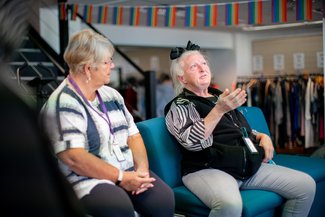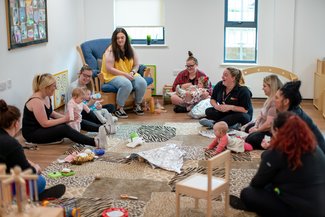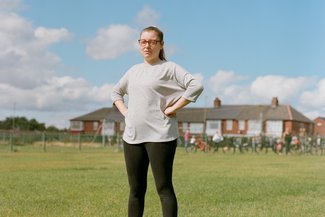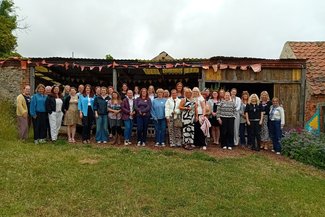
Agenda's Alliance: who joined us in 2024?
Our Alliance has gone from strength to strength this year; we celebrate the nine organisations who joined us in 2024.

4 Nov 2025
In this blog, Agenda Alliance Trustee, Anne Kazimirski, discusses ten years of impact at Agenda, the challenges of measuring systems change, and what success looks like when trying to change the systems that harm women and girls.
At Agenda Alliance, we aim to change perceptions, power, policy and practice to enable women and girls experiencing the sharpest forms of marginalisation to thrive.
We are working on changing systems, through influencing parts of the system such as police response, council policies, healthcare practice, and the way all these institutions and services interact, all to better support women and girls at the sharpest end of inequality.
Systems change is complex, long-term, and non-linear. It’s systems change that can have the most sustainable and lasting impact on women’s lives, but it is also the hardest type of intervention to evidence, and hence to prioritise and fund. The level of certainty in systems change evaluation is never going to be the same as a programme evaluation counting the number of participants with improved outcomes. And by definition, it tends to need and involve a cumulative range of actors working together in collaboration, so attributing or portioning out impact to particular organisations or actions is not always feasible nor sometimes even helpful.
But if you address the complexity head on, and manage your expectations, understanding progress towards change is feasible, and Agenda Alliance have aced it in our brilliant impact report marking our first 10 years. I can unashamedly praise it as it was produced before I joined the board, and I love it.
We harness the collective power of our alliance, our research, and women and girls themselves, to influence government, services, and the media. The system needs to be informed by women's experiences, and our members who are most closely supporting them.
When considering our impact, what matters to us is our success in:
Partnering with sector stars
A systems approach shifts the focus from individual parts to how the parts are organised, and strengthens key relationships: we now have 130 members, from large, national bodies, to small but mighty specialist organisations, spanning every sector relevant to women and girls’ unmet needs, including: Clinks, the Birmingham Women’s Centre Anawim, Women For Refugee Women, and Birth Companions.
Shifting the narrative and amplifying brilliant voices
Our work has been mentioned 55 times in Parliament so far, and we’ve contributed to over 200 media stories to combat stigma. Our Women’s Advisory Network, a group of women with lived experience of multiple unmet needs, have launched reports in Parliament, spoken to the media, and developed key asks for our election campaigning.
Securing sustainable changes to policy or legislation
In partnership with our sector partners, we have secured major wins such as amendments to bills like the Police, Crime, Sentencing and Courts Bill, and the inclusion of young women’s needs as a core strand of work of the new Women’s Justice Board
Securing life-saving changes to practice
Our report on women in the North East of England being 1.7 times more likely to die early as a result of suicide, addiction or domestic violence contributed to Newcastle Council commissioning a specialist women’s addiction worker in a women’s centre, which led to a new regional network, Transforming Together

To better understand our impact, as well as to continually learn and improve, our approach embraces the complexity of our work, helps us capture what really matters, and will support us to make sense of our contribution over the next ten years. Our focus is on changing behaviours and mindsets, to increase engagement with the issue and our suggested solutions, so the extent to which these are changing will be key to track.
Systems change can be an uphill battle; it’s important to take time to step back and acknowledge your achievements and the people who made it possible.
Next week, I am looking forward to celebrating our 10 years of success with our first ever members’ convention, joined by key players across government, and chaired by Baroness Lola Young. We will share expertise and experiences, collaborate, and stand in solidarity. We’ll celebrate our achievements, confront our growing challenges head-on, and be bold in developing the solutions we need.
Systems change is possible, and together we are building a better future.
Anne specialises in social impact strategy and evaluation, with 25 years’ voluntary sector and philanthropy experience, improving effectiveness to reduce inequality.
As a feminist leader, Anne has been deeply engaged in women’s rights through her volunteering, research and consultancy support. She has advised numerous organisations tackling violence against women, including the Centre for Women’s Justice, Standing Together Against Violence Against Women, and Women’s Aid. She was also trustee and volunteer counsellor for Herts Rape Crisis for five years.
She has previously led the evaluation team at the thinktank and consultancy NPC, and set up the evidence team at Guy’s and St Thomas’ Foundation, where she focused on reducing health inequalities. She currently provides strategy and impact support as independent consultant.

Our Alliance has gone from strength to strength this year; we celebrate the nine organisations who joined us in 2024.

We're delighted to share Agenda Alliance's impact report, detailing how we've pushed the overlooked and underrepresented needs of women and girls onto the political agenda since our formation.

The Transforming Together Network has published a report offering a model for locally led and collaborative systems chance for women experiencing multiple unmet needs.